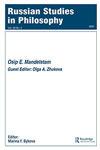An Attempt at Systematic Presentation of the History of Political Doctrines in Boris N. Chicherin’s Major Work
IF 0.1
4区 哲学
Q4 Arts and Humanities
引用次数: 0
Abstract
ABSTRACT This article examines the classification of political doctrines proposed by Boris N. Chicherin in his major work on the history of political thought. Chicherin uses two forms of systematization for political doctrines: in one, he draws attention to the main element used in explaining society (power, personal freedom, law, or the ideal goal of development); in the other, he refers to the initial level of explanation (rational principles, empirical facts, or a synthesis of the two). This article shows that, despite the great significance of Chicherin’s work in Russian philosophy, his proposed model does not correlate well with the real history of political thought and fails to provide an understanding of the general developmental logic of political ideas. The author demonstrates how a more accurate classification of types of political doctrines took shape in mainstream Russian philosophy, expressed in its final form by Semyon L. Frank in his book The Spiritual Foundations of Society. There are two false understandings of society: “singularism,” in which society is seen as an external combination of ontologically separate persons, and “universalism,” in which individuals are completely subordinated to a single national or universal spirit. Frank calls the accurate approach the “organic theory of society,” where the primary ontological unity of individuals is dialectically combined with their secondary, relative autonomy. This article shows that Chicherin’s main error in his philosophical analysis of society lies in rejecting this ontological unity of individuals as the basis of public life.奇切林主要著作中政治学说史的系统呈现
本文考察了鲍里斯·n·奇切林在其政治思想史著作中提出的政治学说分类。奇切林对政治学说采用了两种形式的系统化:一种,他将注意力集中在解释社会的主要因素上(权力、个人自由、法律或理想的发展目标);在另一种情况下,他指的是解释的初始层次(理性原则、经验事实或两者的综合)。本文表明,尽管奇切林的工作在俄罗斯哲学中具有重要意义,但他提出的模型与真实的政治思想史并没有很好地联系起来,也未能提供对政治思想一般发展逻辑的理解。作者论证了俄罗斯主流哲学如何形成更准确的政治学说类型分类,谢苗·l·弗兰克(Semyon L. Frank)在其著作《社会的精神基础》(The Spiritual Foundations of Society)中表达了这种分类的最终形式。对社会有两种错误的理解:一种是“单一主义”,认为社会是本体论上独立的人的外部组合;另一种是“普遍主义”,认为个人完全服从于单一的民族或普遍精神。弗兰克把这种准确的方法称为“社会有机理论”,在这种理论中,个人的主要本体论统一与他们的次要相对自主性辩证地结合在一起。本文表明,奇切林对社会的哲学分析的主要错误在于拒绝把个人的本体论统一作为公共生活的基础。
本文章由计算机程序翻译,如有差异,请以英文原文为准。
求助全文
约1分钟内获得全文
求助全文
来源期刊

RUSSIAN STUDIES IN PHILOSOPHY
PHILOSOPHY-
CiteScore
0.10
自引率
0.00%
发文量
14
期刊介绍:
Russian Studies in Philosophy publishes thematic issues featuring selected scholarly papers from conferences and joint research projects as well as from the leading Russian-language journals in philosophy. Thematic coverage ranges over significant theoretical topics as well as topics in the history of philosophy, both European and Russian, including issues focused on institutions, schools, and figures such as Bakhtin, Fedorov, Leontev, Losev, Rozanov, Solovev, and Zinovev.
 求助内容:
求助内容: 应助结果提醒方式:
应助结果提醒方式:


